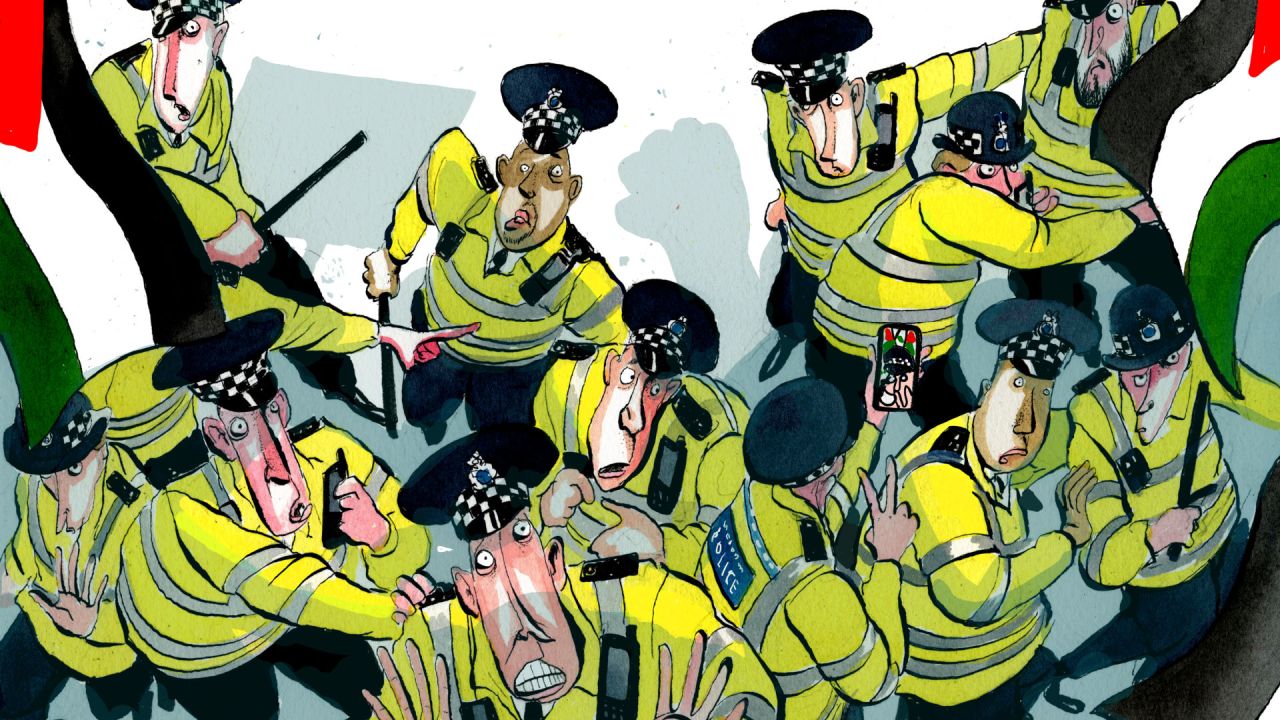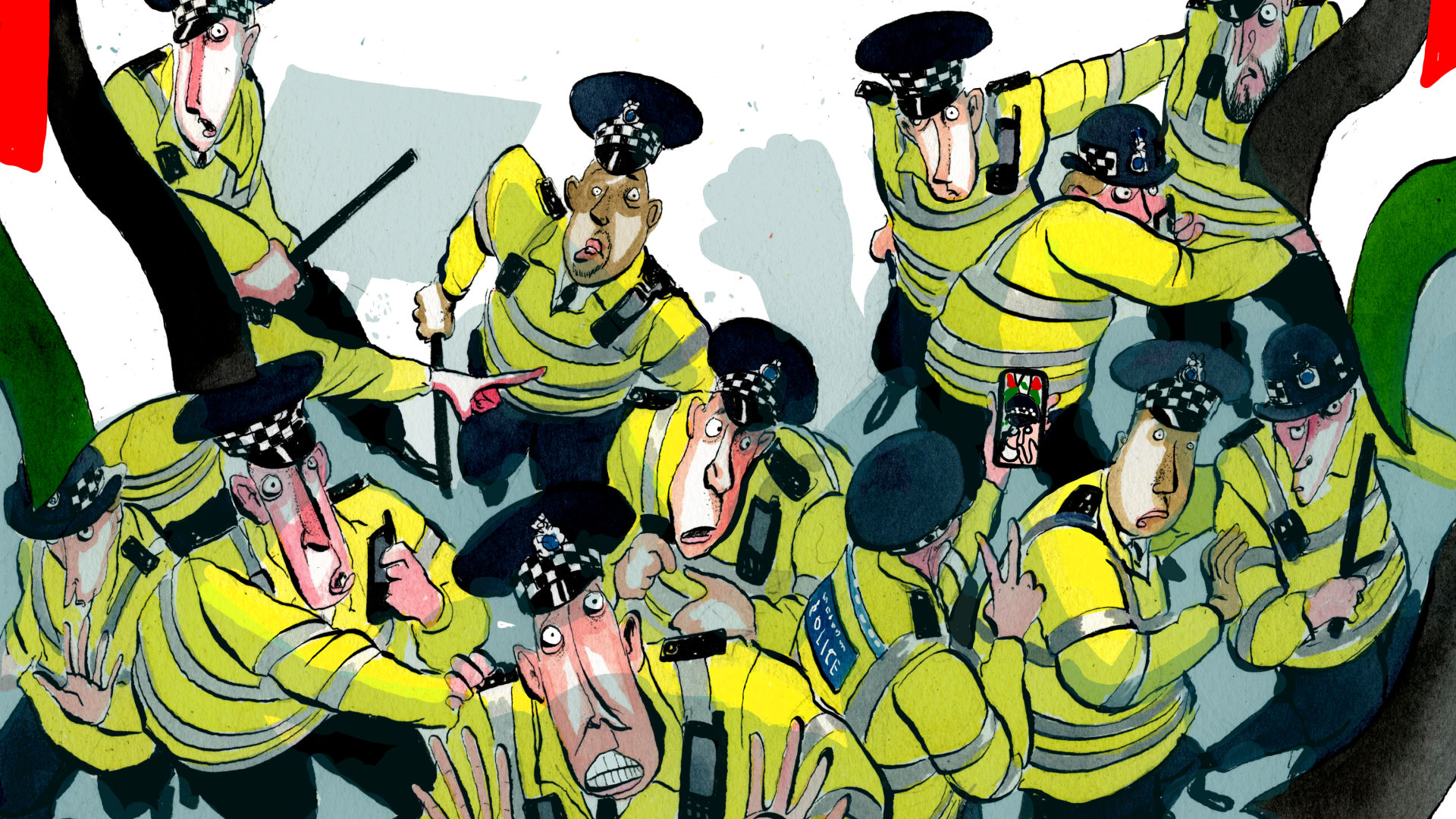Armistice Day is meant to be a moment of solemn national unity. Yet this year it is expected to coincide with the rather less harmonious ‘Million March for Palestine’, as hundreds of thousands gather in central London on Saturday to protest against Israel’s war on Gaza.
Are these events compatible? Should the protest be banned? The Prime Minister says holding the protest on Armistice Day is ‘disrespectful’ but insists that only Sir Mark Rowley, the Commissioner of the Metropolitan Police, can act to stop it. So Rishi Sunak is, in effect, saying his government cannot be blamed if there’s trouble at what Suella Braverman, his Home Secretary, calls a ‘hate march’. It’s all on Sir Mark. ‘My job is to hold him accountable,’ says Sunak.
We don’t need more laws. The problem we have is with existing legislation not being enforced
Politicians can ban marches only if the police refer the decision to them. But the law states that even the police can ban them only in order to prevent ‘serious public disorder, serious damage to property or serious disruption to the life of the community’. They may ask protestors to delay a march (as the Met has done this week) but they cannot block one outright on the grounds of taste or cause.
‘The laws created by parliament are clear,’ Sir Mark has said. ‘There is no absolute power to ban protests, therefore there will be a protest this weekend.’ The legal bar to stop a demonstration is set very high for a reason: to make sure governments cannot silence protest. That’s why the power is used very rarely. The last time was in 2011, when Theresa May forbade an English Defence League rally in London.
Sir Mark, whom I know slightly, is cerebral and independent-minded. He’ll feel the political pressure but argues that it’s his duty to uphold the law – and only the law. He will not be considering whether the protest is provocative or distasteful. He’ll be asking if it contravenes Section 12 of the Public Order Act (1986). This is not just a matter of opinion, he argues: it requires specific intelligence reports flagging the danger of serious unrest. Without such firm intelligence, he says, no police chief can ban any march.
No. 10 is furious, thinking Sir Mark could be more flexible given the circumstances. Ever since 7 October, we have witnessed protests in London that look menacing and, at times, blatantly anti-Semitic. People ask: what are the police doing? The creeping escalation of hate-crime law has led to a peculiar system under which the police are often asked to pass judgment on the merits of a particular cause. Officers are expected to monitor not only what people do but what they say or write or wave around.

This leads to inconsistencies. Attend a vigil for Sarah Everard during lockdown? You’re nicked. March for Black Lives Matter during lockdown? The police will join you in bending the knee.
In fact, just a handful of policemen ‘took the knee’ – to the fury of Cressida Dick, the then commissioner – but, in the social-media age, such lapses of judgment go viral. And while most of the pro-Palestinian protestors plan to raise justifiable humanitarian concerns, there will be no shortage of hardliners with a more sinister purpose.
There have been reports that a former Hamas chief was behind one of the groups organising the protest. The Jewish Chronicle says we can expect a rerun of the 2021 ‘Convoy for Palestine’, in which thugs raced through Jewish neighbourhoods in London blaring out threats to rape mothers and their daughters. Four men were arrested in connection with that ugly event. The Crown Prosecution Service declined to prosecute them.
Commentators who seek to promote the idea of a ‘clash of civilisations’ between the West and Islam will no doubt be given plenty of ammunition. Social media will ensure that the most deranged, inciteful chants are given wide circulation. But you can’t ban a protest just because it causes offence or upsets people online.
Sir Mark says that gaps in the law allow ‘toxic’ messages to be propagated. That’s simply not good enough. We don’t need more laws. The problem is with the existing legislation – which is plainly not being enforced. And this is where debate should focus.
There is no shortage of extremists among pro-Palestinian protestors who will use anti-Semitic language, fly provocative flags and behave in a manner that falls directly into the scope of current laws criminalising incitement to violence, racial or religious harassment and the encouragement of terrorism.
The lack of empathy for Jewish citizens butchered by Hamas after the border incursion and the orgy of systematic sadism in which 1,400 men, women and children were murdered, prompting Israel’s invasion, has been striking and depressing. Sir Mark himself has admitted that the police response to hateful displays should be ‘sharper’.
He has not been helped by the Met’s Twitter account insisting, bizarrely, that the word ‘jihad’ – being screamed on the streets within earshot of police officers – had ‘a number of meanings’ apart from its ordinarily understood support for terrorism.
It has emerged that one of the Met’s senior legal advisers, lawyer Attiq Malik, took part in protests in 2021 and led a chant of ‘from the river to the sea, Palestine will be free’, a phrase commonly associated with the destruction of the state of Israel and the Jews within it. Quite why it took a scoop by the Sunday Telegraph to alert the Met to what they now call ‘language and views that appear anti-Semitic’ – leading to Mr Malik being sacked – remains to be seen.
Add to this the blunt operational reality: the problem of ratios. No police service in the democratic world can control the behaviour of all protestors by numbers alone. To do so would require the elimination of all our hard-fought freedoms, which is exactly what violent extremists yearn for. While there were an estimated 30,000 pro-Palestine protestors in London last weekend, the police presence was 1,300. That’s cops taken away from neighbourhood policing and all the other ongoing public protection work.

In previous weeks, the protestor-to-officer ratio was even worse. The truth is the Met, on present strengths, is barely able to contain such enormous marches. Intervening to arrest troublemakers could well create greater disturbances which would overwhelm available resources. Hence the tactic (seen during the statue-toppling protests) of police standing by, filming the offences and prosecuting people later. This may help avoid short-term riots but it encourages anarchic behaviour.
Those who want to cause offence and trouble will see and exploit these weaknesses. They are committed to confrontation. Critics who say the police lack the stomach for taking on criminal behaviour should see the levels of assault they are so often subjected to going about their normal duties. The problem is not a lack of courage among officers. It’s more a lack of clarity about what they should be doing.
Seeking to ban any parade on Armistice Day would almost certainly mobilise a hard core of protestors to target aspects of our acts of Remembrance in London and beyond. This would be at a time when thousands of veterans are travelling to the capital to remember their war dead and participate in one of the great moments of national solidarity.
Sir Mark will know that, if the protest is banned, smaller protests would probably break out – straining already stretched police resources. Creating a pretext to subvert Remembrance would be a potential disaster for community cohesion, drawing more people into spontaneous protests in more locations – precisely what extremists want. You only need watch the behaviour of Just Stop Oil this week to understand that creating a public spectacle by shock tactics is the end, as well as the means, of publicising a cause.
Those protestors who want to cause offence and trouble will see and exploit police weaknesses
The right to peaceful assembly and protest has always been open to abuse. The anti-Semitic glee of extremist groups that seem to be a permanent parasitical feature of such parades, is hijacking those who only wish to protest the unfathomably miserable conditions of Palestinian civilians in Gaza. This fury is no less legitimate than the much quieter outrage over the fate of some 240 hostages seized by Hamas terrorists.
The Met should not stop a march taking place on Saturday – unless there is a serious risk of terrorism or disorder, and Sir Mark says there is no evidence this is currently the case. I have no issue with the march taking place after the two-minute silence, and away from the Cenotaph, as the organisers have promised. Instead, Whitehall to Trafalgar Square should be sealed off and there must be an overwhelming police presence to ensure good behaviour and everyone’s safety. If Sir Mark cannot guarantee these conditions, or put together the resources to allow police to be seen to be keeping the King’s peace, then all bets are off.
The message which needs to go out to anyone who wants to protest is that we have limits, and that these will be set down and enforced, on this weekend of all occasions. To do their work, the police also require effective prosecutions of those who have transgressed the law. That means a criminal justice system which doesn’t hang up its robes at 5 p.m. on a Friday.
This is a seminal moment when the rights of the majority must take precedence over those who want to subvert our freedoms. The most powerful way we can do this is to show we have a state that can allow public dissent yet keep it firmly within the bounds of decency and legality. The price is worth paying – if Sir Mark’s officers can hold the line.








Comments